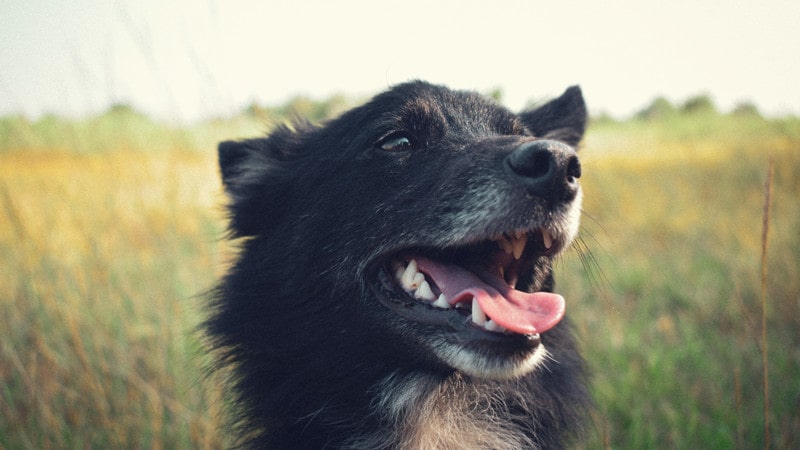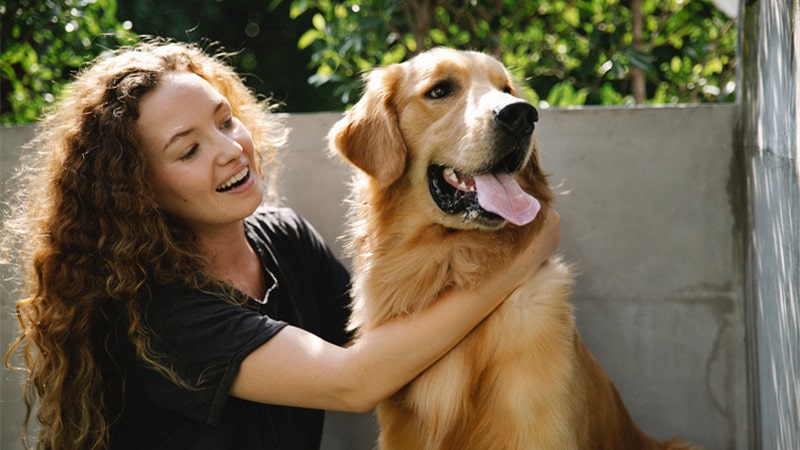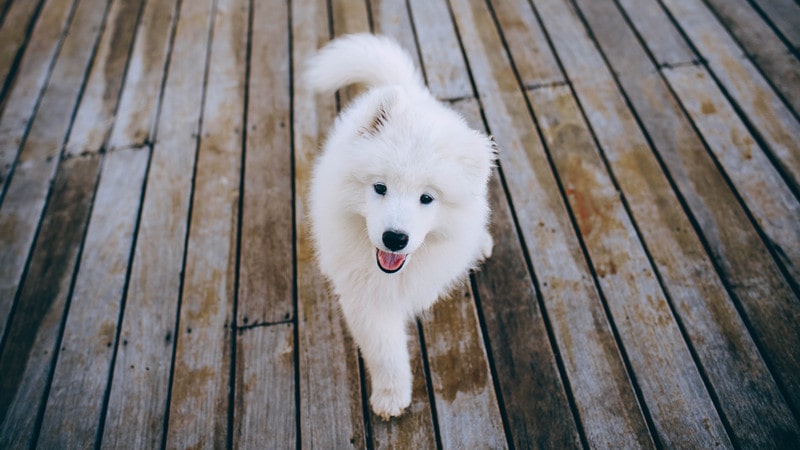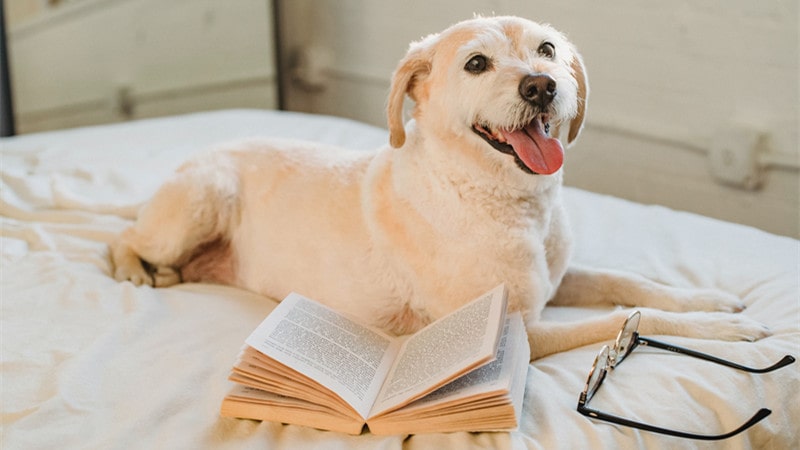While the relationship between you and your dog is personal, there are certain actions that you can do with your canine friend and leave everyone cringing. For instance, some people consider it dangerous and unhygienic to kiss your dog or eat or drink with your dog from the same cup or bowl.
But the question is: Is a dog’s mouth is cleaner than a human’s mouth? This article will answer this and other related queries.
Is a Dog’s Mouth Cleaner Than a Human’s?

Health experts claim that equating the cleanliness of a dog’s mouth to that of a human’s mouth is like comparing apples and oranges. While there are several similarities between the two, the differences are quite overpowering. So, the short answer to this question is no. Here are the main reasons why a dog’s mouth can’t be cleaner than a human’s mouth.
Mouth Bacteria
It’s important to note that dog and human mouths have large amounts of bacteria, many of which aid in the digestion of food. While both species may have some similar types of microbes and bacteria in their mouths, they also host many other diverse types of bacteria.
For instance, both humans and dogs suffer from a periodontal disease caused by a microbe known as porphyromonas. However, the actual bacteria that causes this disease in humans is P. gingivitis, while in dogs is P. gulae.
It’s also important to mention that studies have revealed that the number of bacteria in a human’s mouth is almost the same as that in a dog’s mouth. Researchers claim that there are about 600 types of bacteria in a dog’s mouth. Thankfully, most of these bacteria aren’t zoonotic, meaning that you won’t get an infection from kissing or sharing food with your canine.
But this doesn’t mean that you can’t get a bacterial infection from coming into contact with fluids from your dog’s mouth. For instance, a dog’s mouth is full of a harmful bacterium called Pasteurella canis, which is known to cause skin infections in humans when they are bitten by dogs. Another common bacterium in a dog’s mouth is Capnocytophaga canimorsus, which is also transmitted through a dog bite.
These bacteria can cause serious infections when you ingest them or if your mouth has an open wound. You should also avoid coming into contact with fluids from your dog’s mouth because your dog is likely to eat foods contaminated with dangerous pathogens like Salmonella and E. coli.
If your dog’s drool gets into your mouth, it may transfer these pathogens to you, causing serious infections. Although raw foods are more likely to have these pathogens, any dog food could be contaminated.
Viral Infections
Apart from transmitting bacteria through their saliva, a dog’s saliva is also known to transmit viruses. For instance, it can transmit a serious virus called rabies if your dog is infected. When this virus gets into your blood system, it attacks your nervous system, resulting in a rabies infection, which is fatal. Therefore, it’s important to keep an eye on your dog to ensure that it’s doesn’t have rabies.
The most obvious signs of rabies in dogs include anxiety, nervousness, aggressiveness, uncoordinated behavior, disorientation, random attacks, tremors, and seizures. If you notice any of these symptoms in your dog, call the police or your local animal control immediately. You should also keep the infected dog on a leash and locked away from people and other pets.
Can You Get Germs from Kissing Your Dog?

Given the number of bacteria present in a dog’s mouth, many people are concerned about their safety when kissing their dogs. While some people love to kiss their canine friends, many health experts advise against it claiming that it could lead to infections.
For instance, a dog’s mouth is full of bacteria commonly referred to as Pastuerella, which is known to affect the skin, lymph nodes, and cause other serious infections.
Other common bacteria found in a dog’s mouth, that could cause serious infections, include Bartonella henselae, Salmonella, Clostridia, Campylobacter, and E. coli. Some of these bacteria are intestinal pests that can result in serious intestinal infections. Most cases of people getting infections from kissing their dogs occur when there is fecal residue on the dog’s mouth.
Even if your dog doesn’t feed on any fecal material, it’s likely to have fecal residue stuck on its mouth when it licks its anus. If your dog’s drool finds its way into your mouth, you are likely to develop an infection. Sometimes your dog may transmit parasites to you when its saliva enters your mouth. These parasites will most likely result in intestinal diseases, skin disorders, brain complications, and blindness.
Even with all these risks, a dog’s drool can promote faster healing of wounds. This saliva contains a special chemical called histatin that helps in wound healing by enhancing the circulation and relocation of new skin cells. Studies have also shown that children, elderly people, and immunosuppressed people on chemotherapy or who are suffering from AIDS are likely to develop infections from kissing or having oral contact with dogs.
But also healthy people are unlikely to get infected, they are advised to take precautions when kissing their dogs. Furthermore, you are supposed to deworm your dog regularly and take it for an annual fecal examination. Give your dog the right anti-parasite and pest treatments regularly and dispose of all fecal materials properly. Don’t forget to clean your dog’s mouth frequently.
How to Clean Your Dog’s Mouth

Your dog’s oral hygiene is as essential as it is for you. It’s even more important if you are fond of kissing your dog. If you don’t keep your dog’s mouth clean, it may lead to serious medical problems, such as kidney, liver, and heart complications. Here are some useful tips on how to clean your dog’s mouth.
1. Brushing
Teeth brushing is an important part of maintaining good oral hygiene for both humans and dogs. Therefore, you should brush your dog’s teeth at least once a day. Remember to use flavorful toothpaste to encourage good teeth brushing behavior in your dog.
Fortunately, you can easily find a toothpaste that’s specifically meant for dogs. There are also special toothbrushes that are specifically designed for dogs. These brushes come with angled handles to help you access the tiny corners and gaps in your dog’s mouth. Try to establish a regular tooth brushing routine to keep your canine’s mouth clean.
2. Nibbling on Dental Chews
Apart from stimulating natural cravings, dental chews also help to clean a dog’s mouth. They prevent the buildup of harmful plaque in your dog’s mouth, thus keeping its teeth strong and healthy for a long time. Furthermore, dental chews have nubs and folds that push into your dog’s oral crevices to remove any hidden tartar and stimulate blood circulation in the gums.
3. Dental Spray
If your dog can’t tolerate regular teeth brushing, you should use a dental spray that is specifically designed for dogs. It’s more convenient and a quick way to clean your dog’s mouth. A dog’s dental spray helps to kill bacteria and germs that could be hiding in the canine’s mouth.
This spray will also eliminate bad odor from your dog’s mouth by getting rid of plaque and tartar. To use the spray, you simply spritz your dog’s teeth and gums. If your dog becomes aggressive when spraying its mouth, you can apply the spray on its toys and dental chews.
4. Professional Veterinarian Cleaning
Even if you follow any of the above-mentioned tips, it’s important to take your dog for a professional veterinarian cleaning once in a while. Since veterinarians are trained in identifying, treating, and preventing oral problems in dogs, they are in a better position to clean your dog’s mouth. Your dog needs a professional oral checkup and cleaning at least once a year.



